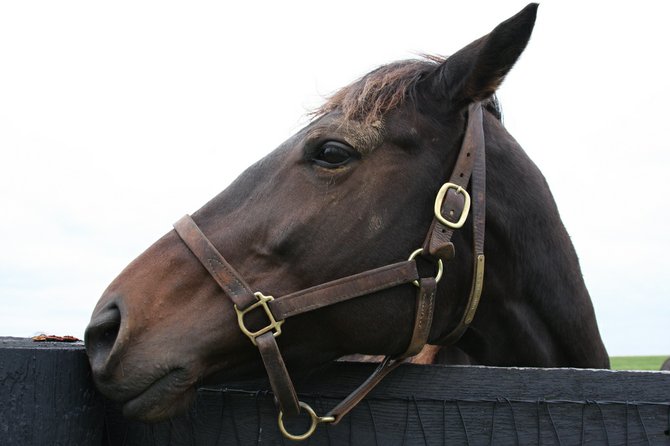Horses for Handicapped gives local kids and adults with disabilities a chance to interact with horses. Photo by Courtesy Flickr/tasweertaker
I arrived at the Mississippi State Fairgrounds on a cold mid-April morning last year. Buses and cars were already parked from schools all over the state. A line of kids and adults waited with patience but with a bubbling excitement to enter the horse arena. The smell of livestock greeted me almost as fast as the smiling faces lined up to get inside.
The fairgrounds were hosting Horses for Handicapped. Most of the people in line waiting to get in were special-needs kids and adults. A ramp leading to the arena greeted the participants, with two strong young men at the end, ready to lift those who needed extra help on to a horse. Once a participant was in the saddle, another volunteer sat behind the rider to hold her steady, and a group of about five people ringed the horse, ready to help just in case the rider began to fall.
As the riders circled the arena, they were beaming and waving--their faces looked like Christmas had come early. At certain points, volunteers hollered "yee-haw!" as a rider went past. Those yee-haws made the riders smiles even broader as they made their three laps around the arena.
Horses for Handicapped gives people with special needs a chance to ride a horse, and participate in horsey games like pin the tail on the donkey and horseshoes. During the event, participants could enjoy a petting zoo, a wagon ride or have their pictures taken on a patient and still horse. Over four days, more than 1,600 special-needs kids and adults made their way through the fairgrounds.
"This is the finest humanitarian event that happens on the fairgrounds during the year," said Billy Orr, executive director of the Mississippi State Fairgrounds Commission. Steve Godbolt, who worked the event and generously gave me a tour, agreed with Orr.
"We rely on the generosity of many volunteers," Godbolt said. "The support we get from the fairgrounds is outstanding, and they are great at getting the area ready."
No paid staff are involved with Horses for Handicapped. Every person who takes part donates his or her time or food to help feed other volunteers. T-shirt sales and donations help finance the next year's event.
Horses for Handicapped, now celebrating its 32nd year, is usually in April at the fairgrounds. It takes 250 volunteers to pull off the four-day happening. Horses for Handicapped relies on donated and loaned supplies for everything: Tack, petting-zoo animals, wagons and the horses themselves are all contributed. Wranglers even donates bandanas for participants to wear, so they'll feel like real cowboys.
Watching the riders and volunteers, it struck me how much able-bodied folks, like myself, take for granted in everyday life. I also noticed that those standing near me--the teachers, parents, and volunteers are touched, and aren't afraid to show their emotions. These kids and adults reminded me that there are things in life we should cherish more such as simple horse rides.
Joann Benjamin, in an article for the American Hippotherapy Association website, argued that interaction between horses and people with disabilities has positive physical and psychological effects. Some of the physical effects are motor coordination, posture improvements, and balance. Psychological effects include self-esteem and being outdoors instead of a doctors office. Groups like the American Physical Therapy Association along with other organizations recognize the benefits of horse interactions with handicapped individuals.
Moving around the event, it was fun to watch the petting zoo, where kids walked timidly toward the crowd of sheep and goats. Once they fed the animals or began to pet them, their mood lightened and their faces shone with broad smiles. Children petting the animals looked back and smiled at their teachers or parents as they kept feeding or petting. I wished that the moment could never end for these kids.
"We are fortunate to have experienced and good horse people to help ease the horses and the kids," Godbolt said. "We are also fortunate to have great volunteers in our stations as well."
Horses for Handicapped exists solely through donations and volunteers. The organization is a 501c3 non-profit, which means any money donated is tax deductible. The event will be at the Mississippi State Fairgrounds (1207 Mississippi St., 601-961-4000) April 15-18. For more information or to donate, visit the Horses for Handicapped website at horsesforhandicappedms.com.


